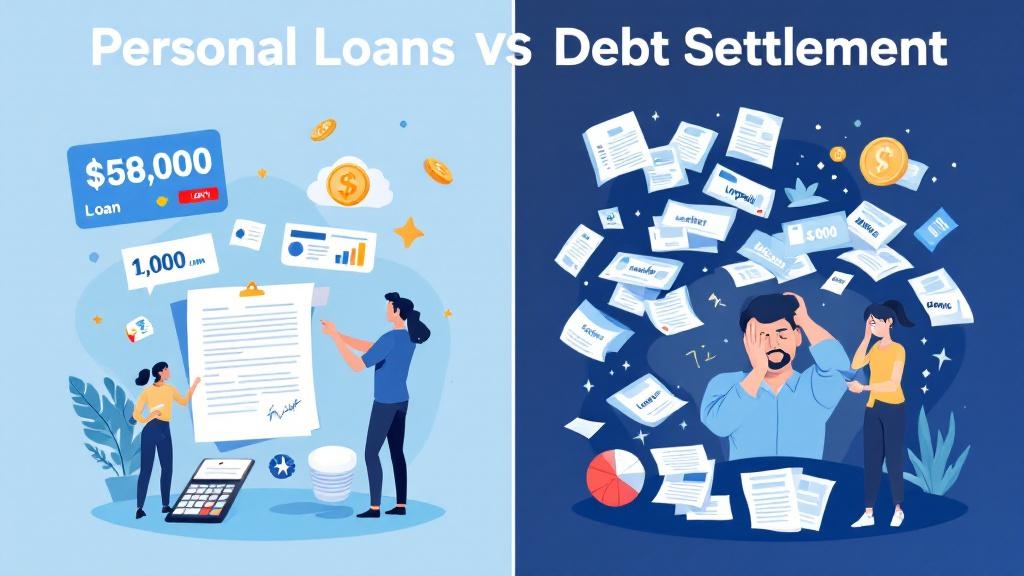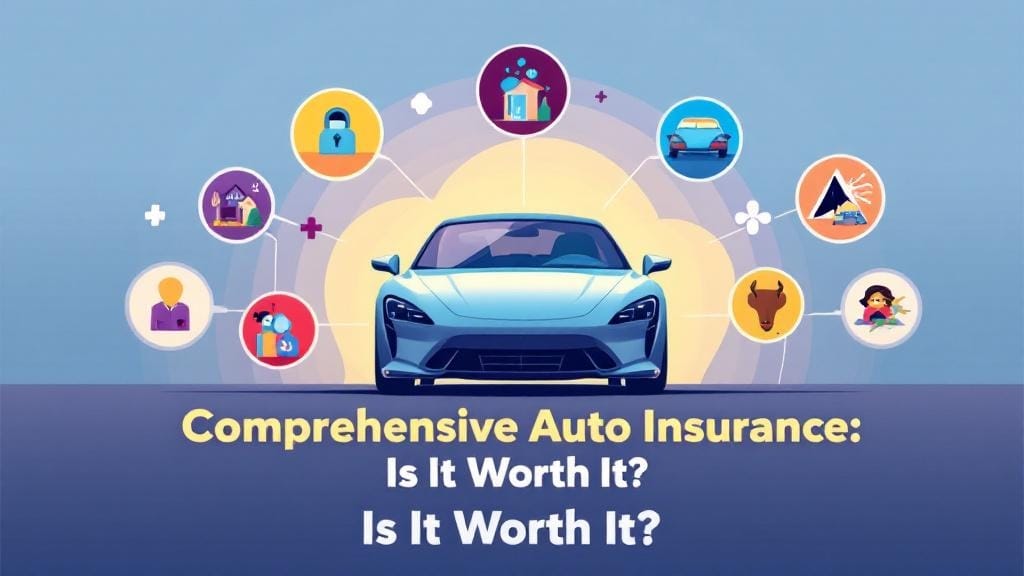Debt can quickly become overwhelming, and when you find yourself in financial distress, you’re left with difficult decisions. Should you consider a personal loan for debt consolidation? Or would a debt settlement program be a better choice? Both options aim to provide relief, but they differ significantly in terms of how they impact your finances, credit score, and long-term stability.
In this blog post, we’ll dive into the pros and cons of personal loans vs debt settlement, helping you determine which option best suits your financial needs. Whether you’re considering a personal loan to consolidate debt or exploring the potential benefits of a debt settlement program, we’ll cover it all in simple, clear language. Plus, we’ll answer some of your frequently asked questions to help you make a more informed decision.
What is Debt Settlement?
Debt settlement involves negotiating with your creditors to reduce the amount of debt you owe. In this process, you or a debt settlement company will attempt to convince your creditors to accept a lump sum that’s less than what you owe. This could be a viable option if you’re struggling with substantial debt and can’t afford to make full payments.
Pros of Debt Settlement
Debt settlement programs can provide relief, but like everything, they come with both advantages and disadvantages.
1. Reduced Debt:
-
You could end up paying only a fraction of what you owe, which might seem like a fresh start if you’re buried in debt.
2. Lower Monthly Payments:
-
Debt settlement might result in reduced monthly payments, giving you more financial breathing room.
3. A Solution for Those Unable to Pay:
-
If you can’t afford the full amount, debt settlement offers a chance to negotiate a manageable settlement.
Cons of Debt Settlement
While the benefits might seem attractive, there are several risks you should be aware of.
1. Credit Score Impact:
-
Debt settlement can negatively affect your credit score. Creditors may report your accounts as “settled” rather than “paid in full,” which could cause a significant drop in your score. This is something to consider if your credit score is important for future purchases, like buying a home or car.
2. Tax Implications:
-
Any debt that’s forgiven (the amount you no longer owe) could be considered taxable income, and you may be required to pay taxes on it.
3. Potential Scams:
-
Some debt settlement companies are less than trustworthy, charging high fees without offering meaningful results. Always do your research before hiring any service.
What is a Personal Loan for Debt Consolidation?
A personal loan for debt consolidation involves taking out a new loan to pay off multiple existing debts. Essentially, you combine your various credit card balances, medical bills, and other debts into one loan, often with a lower interest rate. This can make it easier to manage your debt, especially if you’ve been juggling multiple payments.
Pros of Personal Loans for Debt Consolidation
Taking out a personal loan to consolidate debt can offer numerous advantages, especially if you’re looking for a clear, structured way to pay off what you owe.
1. Simplified Payments:
-
Rather than juggling multiple bills and payment dates, a personal loan consolidates everything into one easy-to-manage payment.
2. Lower Interest Rates:
-
If you qualify for a lower interest rate than the one you’re currently paying, you can save money in the long run.
3. Improved Credit Score:
-
Personal loans can potentially boost your credit score, especially if you pay them off on time. This is because consolidating your debt reduces the total number of open accounts, which can have a positive impact on your credit utilization ratio.
Cons of Personal Loans for Debt Consolidation
While personal loans for debt consolidation can offer a fresh start, they’re not without their drawbacks.
1. High Fees:
-
Some lenders charge fees for taking out a personal loan, including origination fees and late payment penalties.
2. Risk of Accumulating More Debt:
-
If you don’t address the root cause of your debt problems, you may end up taking on more debt after consolidating.
3. Qualification Criteria:
-
To secure a low-interest personal loan, you typically need a good credit score. If your credit is less than stellar, you might be offered a higher interest rate, which could negate the benefits of consolidation.
Debt Settlement vs Personal Loan: Which Is Right for You?
Now that we’ve explored both options, let’s compare the two and discuss the pros and cons of each to help you decide what’s best for your situation.
1. Impact on Your Credit Score
-
Debt Settlement: Debt settlement will likely harm your credit score in the short term. However, once your debt is settled, your credit score may improve over time as you pay down the remaining balances.
-
Personal Loan: Using a personal loan for debt consolidation can actually improve your credit score, especially if you have a good credit history and keep up with the payments.
2. Debt Reduction
-
Debt Settlement: With debt settlement, you might only pay a portion of what you owe, which is an attractive option if you are in dire financial straits.
-
Personal Loan: A personal loan does not reduce the total amount of debt you owe, but it can provide more favorable terms, such as lower interest rates.
3. Fees and Costs
-
Debt Settlement: Debt settlement programs often charge fees, and some may be hidden or excessive. Be sure to check the fine print.
-
Personal Loan: A personal loan may come with origination fees or other costs, but these are typically more straightforward and easier to understand.
4. Eligibility and Qualification
-
Debt Settlement: You don’t need good credit to pursue debt settlement, but you do need to be behind on your payments in most cases.
-
Personal Loan: You’ll likely need a decent credit score to qualify for a personal loan with favorable terms. This may not be an option if your credit is poor.
FAQs: Personal Loans vs Debt Settlement
1. Is it better to get a personal loan or settle debt?
It depends on your financial situation. If you can afford to make regular payments and qualify for a lower interest rate, a personal loan might be a better option. If you can’t afford your debt or don’t have good credit, debt settlement might be more appropriate.
2. How does debt settlement affect your credit score?
Debt settlement can have a negative impact on your credit score, as creditors typically report the account as “settled” instead of “paid in full.” However, the effect can be temporary if you make an effort to improve your credit after settling the debt.
3. What are the risks of using a debt settlement company?
The risks of using a debt settlement company include high fees, potential scams, and the possibility of further damage to your credit score. It’s important to research and choose a reputable company if you go this route.
4. What’s the best way to consolidate high-interest debt?
A personal loan is often the best way to consolidate high-interest debt because it can offer a lower interest rate, saving you money over time. However, if you have substantial unsecured debt and can’t make payments, debt settlement may also be an option.
5. Can I use a personal loan to pay off credit card debt?
Yes, a personal loan for debt consolidation can be used to pay off credit card debt. This can be particularly helpful if the personal loan offers a lower interest rate than the credit cards, helping you save money.
6. What’s the difference between debt settlement and personal loans?
Debt settlement involves negotiating with creditors to reduce your overall debt, while a personal loan is a new loan used to consolidate multiple debts into one, often at a lower interest rate.
7. Should I settle my debt or take out a loan?
The decision depends on your financial situation. If you’re struggling with payments and can’t afford to pay off your debts, debt settlement may be a good option. If you’re looking for a structured way to pay off debt at a lower interest rate, a personal loan may be the better choice.
Conclusion: Making the Right Choice
Choosing between personal loans vs debt settlement ultimately depends on your financial goals, credit score, and the amount of debt you’re managing. Personal loans can provide a streamlined solution for consolidating debt with potentially lower interest rates, while debt settlement can offer immediate relief if you’re struggling to make payments.








Comments (0)